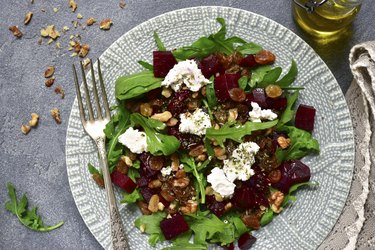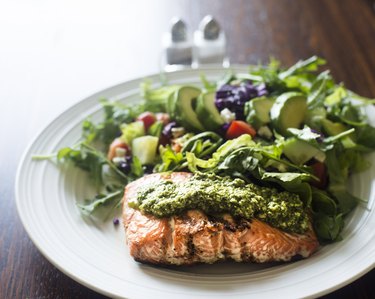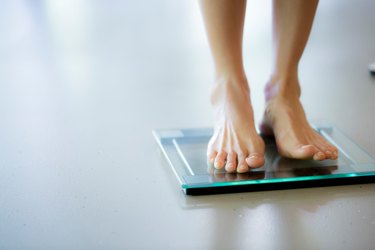
If you have high blood pressure, you're probably on the lookout for safe, sensible ways to bring those numbers down to a healthy level. And if losing weight is an approach you want to take, you might wonder if diet pills are something to consider.
There are a number of ways to go about lowering your blood pressure, including reducing stress, eating a healthy diet, exercising regularly and losing weight if necessary or maintaining a healthy weight, according to the Mayo Clinic. Some people will also need medication to manage their blood pressure.
Video of the Day
Video of the Day
But of all these ways to manage blood pressure, weight loss might be the most effective, notes the American Heart Association (AHA), and even losing 5 to 10 pounds can lead to lower blood pressure levels.
"Weight loss is considered a critical component of blood pressure control," says Thomas F. Boyden, MD, Michigan-based medical director of preventive cardiology at Spectrum Health. "Attaining and maintaining a healthy weight is essential for long-term metabolic health."
Losing a small amount of weight can have a wide variety of other benefits for your health, per the Obesity Action Coalition, including lower cholesterol, a lower risk for diabetes, less inflammation, a lower risk for obstructive sleep apnea and much more.
Are Diet Pills Safe With High Blood Pressure?
Though losing weight to help manage high blood pressure is often a good idea, you'll want to be careful how you go about it. Some weight-loss medications and supplements, for example, may pose a risk for people with high blood pressure.
"Diet pills are stimulants: They raise your heart rate and blood pressure," says Susan Besser, MD, a primary care provider specializing in family medicine with Mercy Personal Physicians in Overlea, Maryland. "They are not safe and should not be taken without approval from your doctor."
The specific risks vary, depending on the medication. For instance, according to the National Institute of Diabetes and Digestive and Kidney Diseases (NIDDK), the medication naltrexone-bupropion (Contrave) can cause problems for people with high blood pressure.
Also, some medications that curb your desire to eat can lead to increased blood pressure, including phentermine (Adipex-P), benzphetamine (Didrex), diethylpropion (found in some generic medications) and phendimetrazine (Bontril and Bontril PDM), per the NIDDK.
However, weight-loss medications are much safer than in years past, and many options are considered acceptable for people with high blood pressure, according to Harvard Health Publishing. The key is to work closely with a trusted health care professional to choose the right treatment.
Concerns about supplements if you have high blood pressure may be significant, per the Mayo Clinic. Some popular weight-loss supplements, such as ephedra, or ma-huang, have actually been banned due to their risks to the heart. Other supplements that can pose risks for people with high blood pressure, according to the Office of Dietary Supplements, include bitter orange, hoodia, yohimbe and more.
It's also important to remember supplements are not subject to the same U.S. Food and Drug Administration review and approval process that medications get, so knowing exactly what's in a supplement is an iffy proposition.
A Healthier Way to Lose Weight
When it comes to managing blood pressure, the AHA recommends eating a healthy, nutritious diet that's low in salt and getting plenty of exercise.
"You have to realize this is not a get-rich-quick scheme," says B. J. Hicks, MD, a vascular neurologist and co-director of the Comprehensive Stroke Center at OhioHealth Riverside Methodist Hospital in Columbus, Ohio. "There are certain diets that have been shown to lower blood pressure. The DASH diet is one, as well as the Mediterranean diet."
Mix a balanced diet with regular exercise, and it can begin to pay dividends, Dr. Hicks says. "Over time, if you are combining a good diet with routine exercise, it can make a big difference," he says. "It's about getting up and moving for the majority of the week, for at least 20 minutes at a time. Combined with dietary changes, this can help you lower blood pressure and lose weight."
- Mayo Clinic: “High Blood Pressure (Hypertension)”
- AHA: “Managing Weight to Control High Blood Pressure”
- Thomas F. Boyden, MD, medical director of preventive cardiology, Spectrum Health
- Obesity Action Coalition: “Benefits of 5-10 Percent Weight Loss”
- Susan Besser, MD, family medicine specialist, Mercy Personal Physicians, Overlea, Maryland
- NIDDK: “Prescription Medications to Treat Overweight & Obesity”
- Mayo Clinic: “Dietary Supplements for Weight Loss”
- ODS: “Dietary Supplements for Weight Loss”
- Harvard Medical School: “Weight-loss Drugs and Your Heart”
- B. J. Hicks, MD, vascular neurologist, co-director, Comprehensive Stroke Center, OhioHealth Riverside Methodist Hospital, Columbus, Ohio
Is this an emergency? If you are experiencing serious medical symptoms, please see the National Library of Medicine’s list of signs you need emergency medical attention or call 911.



